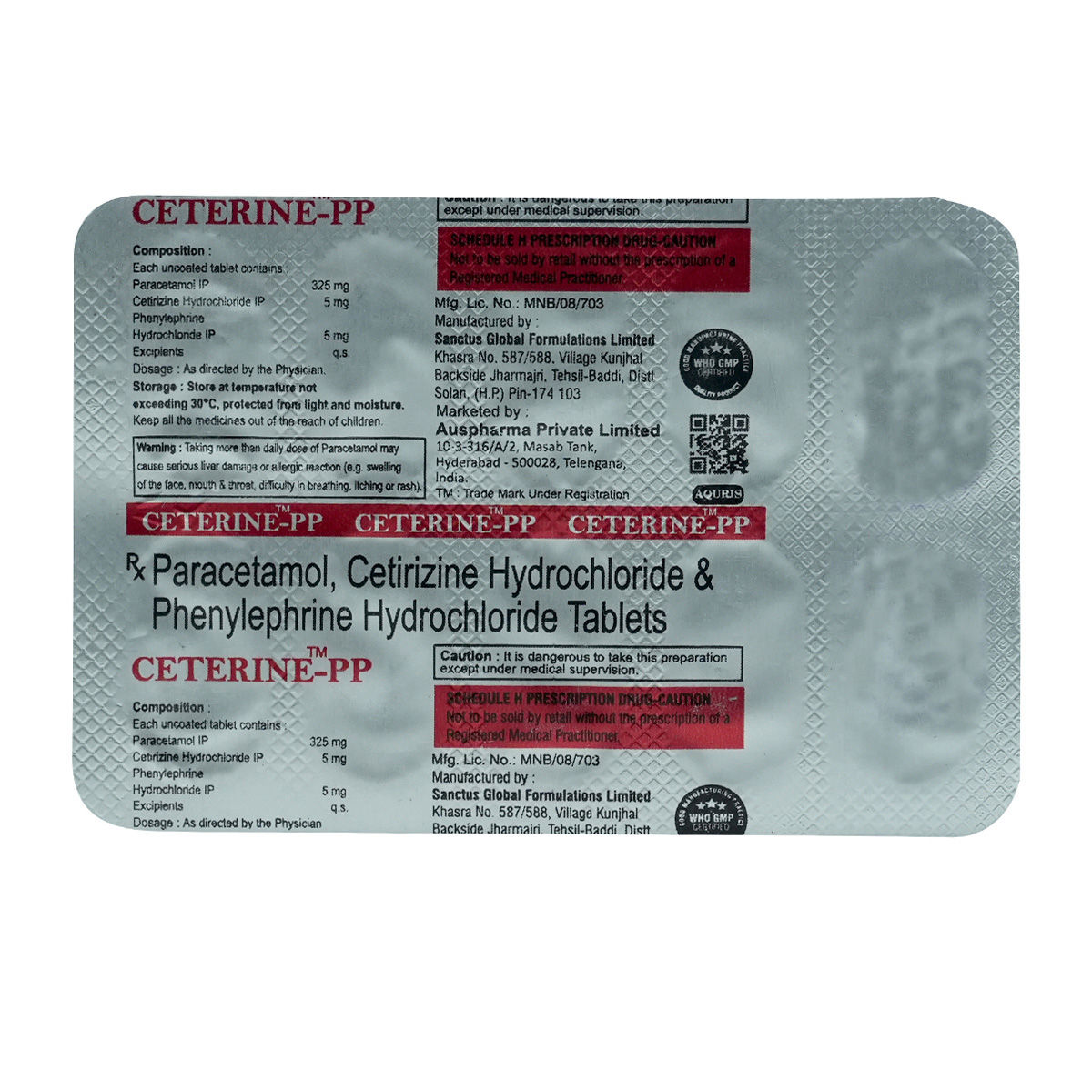Phepar Tablet
₹35.1*
MRP ₹39
10% off
₹33.15*
MRP ₹39
15% CB
₹5.85 cashback(15%)
Free Delivery
With Circle membership
(Inclusive of all Taxes)
This offer price is valid on orders above ₹800. Apply coupon PHARMA10/PHARMA18 (excluding restricted items)
Know Your Delivery Time
Provide Delivery Location

Whats That

Secure Payment

India's Most Trusted Pharmacy

Genuine Products
About Phepar Tablet
Phepar Tablet belongs to a category of 'cough and cold medications' primarily used to treat the common cold and allergic symptoms like sneezing, watery eyes or itchy/watery nose and throat. The common cold is a respiratory illness affecting the nose and throat, mostly caused by viruses known as 'rhinovirus'. The virus attacks the body through the mouth, nose, or eyes and spreads quickly through droplets in the air when a sick person sneezes, coughs or talks.
Phepar Tablet contains Cetirizine (antihistamine/antiallergic), Phenylephrine (decongestant) and Paracetamol (mild analgesic and antipyretic). Cetirizine belongs to the class of antihistamines (antiallergic drugs) that works by blocking the action of histamine, a substance responsible for causing allergic reactions. It helps relieve allergy symptoms such as sneezing, running nose, watery eyes, itching, swelling, congestion, or stiffness. Phenylephrine helps shrink the blood vessels in the nasal passage, reducing a stuffy nose. Paracetamol is an analgesic (relieves pain) and antipyretic (reduces fever) that works by inhibiting the production of certain chemical messengers in the brain known as 'prostaglandins' responsible for pain and fever.
Phepar Tablet should be taken as prescribed by the doctor. Your doctor will recommend how often you take Phepar Tablet based on your medical condition. Some people may experience drowsiness, nausea, fatigue, dryness in the mouth, headache, and vomiting. Everyone doesn't need to experience the above side effects. Most of these side effects of Phepar Tablet do not require medical attention and gradually resolve over time. However, if the side effects persist or worsen, please consult your doctor.
Inform your doctor if you are pregnant, planning for pregnancy or breastfeeding before starting Phepar Tablet. If you have high blood pressure (hypertension), liver or kidney disease, or coronary artery disease (heart disease), avoid using Phepar Tablet as it may worsen your condition. Consumption of alcohol should be avoided as it may lead to excessive drowsiness and sleepiness. Do not take Phepar Tablet if you have taken an MAO inhibitor (anti-depressant medication like Isocarboxazid, Phenelzine, Selegiline and Tranylcypromine) in the last 14 days. Intake of more than 4 gm of paracetamol can damage your liver, so it is better to avoid the use of Phepar Tablet in severe liver damage. Cetirizine present in the Phepar Tablet can make you sleepy, so do not drive or operate heavy machinery after taking Phepar Tablet. Phenylephrine in Phepar Tablet should be used with caution in patients with occlusive vascular disease (nerve/artery blockage), including Raynaud's phenomenon (decreased blood flow to the fingers).
Uses of Phepar Tablet
Medicinal Benefits
Phepar Tablet is primarily used to treat the common cold and allergy symptoms such as runny nose, blocked nose, sneezing, congestion, pain & fever. It is composed of three medicines, namely, Cetirizine (antihistamine), Phenylephrine (decongestant), and Paracetamol (mild analgesic and antipyretic). Cetirizine belongs to the class of antihistamines (anti-allergic drugs) that works by blocking the action of histamine, a substance responsible for causing allergic reactions. It helps relieve allergy symptoms such as sneezing, running nose, watery eyes, itching, swelling, congestion, or stiffness. Phenylephrine helps shrink the blood vessels in the nasal passage, reducing a stuffy nose. Paracetamol is a mild analgesic (relieves pain) and antipyretic (reduces fever) that works by inhibiting the production of certain chemical messengers in the brain known as 'prostaglandins' responsible for pain and fever.
Side Effects of Phepar Tablet
- Drowsiness
- Nausea
- Fatigue
- Dryness in the mouth
- Headache
- Vomiting
Directions for Use
Storage
Drug Warnings
Do not take Phepar Tablet if you are allergic to Phepar Tablet, anti-histamine (cetirizine), analgesics (paracetamol), a decongestant (phenylephrine), or any of its ingredients. Please inform your doctor if you are pregnant or breastfeeding before starting Phepar Tablet. If you have high blood pressure, kidney or liver disease, or coronary artery disease, please do not take Phepar Tablet as it is known to interact. Also, inform your doctor about all other medications you have taken before starting Phepar Tablet. Do not stop taking Phepar Tablet even if you feel better without asking your doctor, as your symptoms may come back and even worsen your condition. Phepar Tablet may cause drowsiness and sleepiness, so it is advised not to drive a car or operate machinery. Consumption of alcohol should be avoided as it may lead to excessive drowsiness and sleepiness. Do not take Phepar Tablet if you have taken an MAO inhibitor (anti-depressant medication) in the past 14 days. Also, avoid tobacco consumption as it may worsen your condition further.
Therapeutic Class
Drug-Drug Interactions
Drug-Food Interactions
Diet & Lifestyle Advise
Wash your hands with soap and water regularly to prevent the spread of germs.
Eat plenty of foods rich in good bacteria, like yoghurt, to improve overall health.
Drink plenty of fluids to avoid dehydration.
Gargle with salt water for relief from sore throat.
Avoid alcohol consumption with Phepar Tablet as it may cause tiredness, drowsiness, or lack of concentration.
Habit Forming
How Phepar Tablet Works
What if I have taken an overdose of Phepar Tablet
Country of origin
Author Details
We provide you with authentic, trustworthy and relevant information
Disclaimer
Product Substitutes




_0.jpg?tr=q-80)


